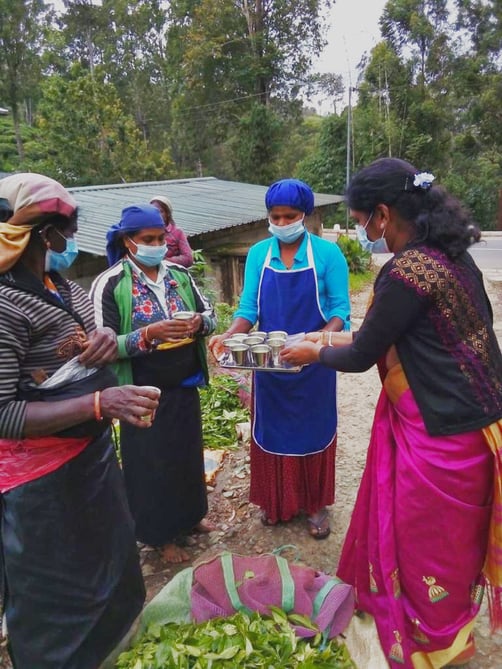It may seem counterintuitive at first, but the problem of malnutrition – both globally and locally – is not solely caused by a scarcity in food or calories consumed, but rather from lack of access to a balanced diet with sufficient quantities of fiber, and essential vitamins, minerals and fiber.
Sri Lanka’s estate communities have a highly wheat-centric food culture, with a simple wheat based meals given that it is easy to make. Breakfast on the estates is usually rotti, with ‘lunu miris’ and a flask of tea. Lunch would be either a wheat based meals or rice with a side of vegetable curries. Given cultural prohibitions on the consumption of beef, lunch and dinner may see the addition of a source of protein like soya meat, chicken or fish.

“While high in calorific value, the average diet of estate communities tends to be very starch-heavy given the nature of work that they do, and also tends to lack in accompanying essential nutrients, vitamins and minerals. Even though prior initiatives had resulted in extensive establishment of home gardens for vegetables, these communities are generally unfamiliar with using these resources in their cooking,” PHDT Community Kitchens Nutritionist, Prriyanga Mohan explained.
This results in the above average consumption of wheat flour at many households’ in the estate sector, when compared with the average Sri Lankan household according to research conducted by the Institute of Policy Studies.
Increasing income levels can over the medium-long term have marked positive impacts, however, an equally important tool in the battle for improving nutritional standards is knowledge. In order to consolidate on progress made in improving nutritional standards among estate communities, new approaches are being pioneered in Sri Lanka that may have the potential for local and global replication
One such model which is already showing early signs of progress has been the Plantation Human Development Trust (PHDT) ‘Community Kitchens’ programme. Established with the goal of reducing child malnutrition by 10% by the end of 2021, the total project envisions the establishment of 60 nutrition enhancement projects across Sri Lanka’s RPC Estates.
At present, as a pilot project, a total of 3 kitchens have started operations, staffed and managed purely by members from local communities that have been trained by PHDT’s dedicated nutritionists. Each kitchen provides daily healthy, balanced meals at affordable prices, and prepared using readily available ingredients, and inventive new recipes to nearly 250 estate workers, factory staff and their families in the areas surrounding Maturata, Talawakele and Bogawantalawa plantations PLC in the Hatton and Nuwara Eliya region.
Based on the strength of its early successes, the PHDT is also actively working to expand the initiative to another 7 estates by end of April 2022.
Novel recipes, nutritious meals
“In order to create a lasting positive change, we quickly understood that simply explaining best practices would be insufficient. We had to create a model in which the community had a chance to become familiar with new recipes, and understand how easy they would be to prepare before they accepted they would be willing to try them out at home, and incorporate these new meals into their culture and daily routine. As a result, our first task was to understand existing diets and preferences, in order to introduce simple but nutritionally dense new recipes which would appeal to preferences of these communities, while being affordable and containing ingredients which could easily be obtained,” the nutritionist stated.
Following a careful study of a typical diet on the estates, the Community Kitchens soon began introducing new, healthy and highly nourishing items like pumpkin soup and smoothies, mushroom quiches, and spinach porridge. In addition such new recipes, the programme also sought to supplement existing staples, leading to new dishes like ‘mallung roti’ and kurrakan (finger millet) string hoppers.
Each recipe was designed with anchor ingredients containing nutrients which directly address some of the most commonly prevalent deficiencies found in these communities. For example: spinach contains high levels of iron which is essential for treating and preventing anemia – one of the most common conditions on estates.
By increasing iron content in estate community diets and substituting tea for pumpkin juice – which is also rich in vitamins A, C, K and B6, as well as key minerals like Iron, Potassium, and Magnesium – the Community Kitchens may have a real chance at reversing anemia in the estates.
“Food has a way of bringing people together, and with the community kitchens initiative, we saw an opportunity to not only directly make a positive impact on what has long been thought of as an intractable issue by elevating nutritional standards, but to also strengthen ties and create opportunities across the estate community.
“The Community Kitchens programme has the potential to be scaled up exponentially, because it’s not just about providing meals, it’s about empowering members from the estate community to bring healthy practices home and incorporate it into to their day-to-day, and even inspire entirely new dishes that incorporate the same approach of encouraging health eating habits through delicious meals . It also creates employment opportunities for those who run the kitchens. As the programme expand, this will be another increasingly valuable contribution of the Community Kitchens,”



